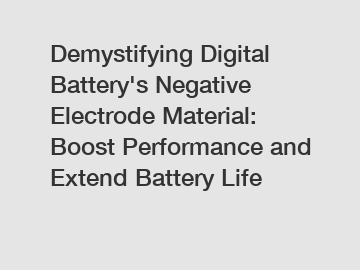Demystifying Digital Battery's Negative Electrode Material: Boost Performance and Extend Battery Life
Demystifying Digital Battery's Negative Electrode Material: Boost Performance and Extend Battery Life?
Demystifying Digital Battery's Negative Electrode Material: Boost Performance and Extend Battery Life?
Digital devices have become an integral part of our lives, and with their increasing usage, battery life has become a crucial concern. The performance and longevity of a battery largely depend on its negative electrode material. But what exactly is the negative electrode? How does it impact the battery's performance? And most importantly, how can we boost performance and extend battery life? In this article, we delve into these questions and shed light on the intricacies of digital battery technology.

1. The role of the negative electrode material:
In a battery, the negative electrode, also known as the anode, is responsible for storing and releasing electrons during charge and discharge cycles. Traditionally, graphite has been widely used as the negative electrode material due to its ability to intercalate lithium ions. However, to meet the growing demands of high-performing digital devices, the need for advancements in negative electrode materials has arisen.
2. The quest for alternative materials:
Researchers around the world are actively exploring alternative materials that can outperform graphite and enhance battery performance while extending its life. Silicon, for instance, has shown great potential as a negative electrode material. Silicon can store a significantly higher amount of lithium ions compared to graphite, leading to higher energy density and longer battery life.
3. Addressing the challenges:
Despite the promise of silicon, it comes with its own set of challenges. One major concern is its expansion and contraction during charge and discharge cycles. Silicon undergoes a substantial volume change, which causes mechanical stress, leading to capacity loss and ultimately reducing the battery's lifespan. To overcome this issue, researchers are developing various strategies. One such approach involves using nanostructured silicon, which can accommodate the volume change more efficiently and improve the overall stability of the battery.
4. Exploring other materials:
Apart from silicon, other materials like tin and germanium are also being considered as potential negative electrode materials. Tin offers a high theoretical capacity and superior cycling stability, making it a promising candidate for next-generation batteries. Germanium, on the other hand, provides high energy density and excellent electronic conductivity. However, both materials face challenges related to volume expansion and the formation of inactive phases. Further research is needed to optimize their usage.
In conclusion, the choice of negative electrode material plays a vital role in the performance and longevity of digital batteries. While graphite has been the conventional choice, the quest for alternative materials has intensified to meet the demands of modern digital devices. Silicon, tin, and germanium are among the materials being explored for their potential to boost performance and extend battery life. Overcoming challenges related to volume expansion and stability remains a focus for researchers. As technology continues to evolve, advancements in negative electrode materials will undoubtedly revolutionize the battery industry, allowing us to enjoy longer-lasting devices without compromising performance.
If you want to learn more, please visit our website China Graphite Block for Blast Furnace, Graphite Block Price, how to make graphite block.
126
0
0


Comments
All Comments (0)